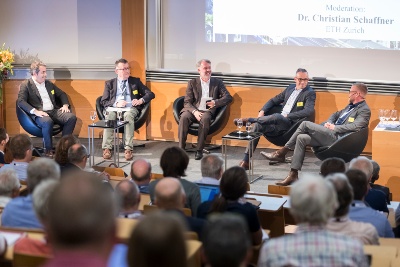Intelligent paths to the mobility of the future
- 6/19/18 10:14 AM
- Kirsten Oswald
A critical reflection on future mobility - ETH eDays Symposium

The Zurich E-Prix took place on 10 June 2018 for the first time in Switzerland. To put the debate about electromobility into a wider context, ETH Zurich hosted a symposium on 8 June as part of the eDays, the official program surrounding the race. It gathered mobility experts not only from ETH Zurich, but also from companies and other institutions to critically reflect on how we can realize a low-carbon and sustainable mobility system.
In the morning session, keynote speaker Prof. Konstantinos Boulouchos (ETH Zurich) gave a systemic overview of the Swiss mobility system. He stressed the importance of sector coupling as the rise of electromobility and renewable energy sources will cause the mobility and energy sectors to become increasingly interlinked. The following talks of the session focused on the technical aspects of future mobility in the area of powertrains, energy carriers and autonomous vehicles. In his presentation, Prof. Christopher Onder (ETH Zurich) highlighted the collaborative project Swiss Trolley plus, where the energy demand of conventional city busses was lowered by 15% by replacing the diesel back-up engine by an improved traction battery system. While Eric Feunteun (Renault) cleared up some myths and facts about electromobility, Dr. Andrea Censi (ETH Zurich) drew attention to some potential advantages such as increased safety, productivity and accessibility as well as challenges associated with autonomous vehicles. In the ensuing podium discussion, panelists agreed that their most pertinent message to policy makers was to engage actively in a dialogue with scientists and inform the public about the facts and the true costs of choosing specific technology routes.
The afternoon session dealt with urban mobility and inter-urban mobility solutions. The keynote speaker Ulrich Spiesshofer (ABB) stressed that it is critical to find technical solutions that move the world without damaging the environment. In this sense, ABB is working on developing new charging, grid and renewable energy technologies that will support electromobility. While Dirk Ahlborn (Hyperloop) illuminated how people may travel between cities by means of high speed so-called “pods” in sealed tubes in the future, Reto Liechti (SBB) discussed how the Swiss railways are evolving from an “infrastructure first” to a “service first”-business. Future SBB mobility hubs will become the central points for new service offers. Nina Skero (CEBR, London) introduced a study she directed evaluating 35 global cities based on their progress towards achieving zero emissions. She highlighted London strategies like the Ultra Low Emission Zone, but was also critical that such initiatives may only cause a “pay to pollute” attitude instead of actually reducing emissions. Finally, Prof. Gerhard Schmitt (ETH Zurich) set urban mobility planning into the wider context of Responsive Cities, where information technology and the involvement of citizens can be used to plan and adapt to changing needs in a sustainable way.
The lively discussion continued during the breaks and at the Apéro, where speakers and visitors could also visit the exhibition of start-up companies in the mobility and energy sectors. Start-ups presented and exchanged about cutting-edge solutions that may change mobility as we know it today.
In case you missed the event, watch the video recording or download the presentations.
Refer to ETH at eDays for more impressions of the event.
Photograph: © ETH Zurich / Alessandro Della Bella
!!! This document is stored in the ETH Web archive and is no longer maintained !!!